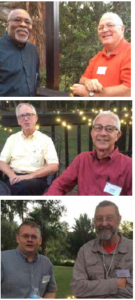
TOP: The Rev. Dr. Neville Crichlow (St. Timothy’s, Daytona Beach) & The Rev. Scott Holcombe (St. David’s, Cocoa Beach). MIDDLE: The Rev. Tom Seitz Jr. & The Rev. John Motis (both serve at Good Shepherd, Lake Wales). BOTTOM: The Rev. Rich Chandler (St. Anne’s Crystal River) & The Rev. Jim Shevlin (Our Saviour, Okeechobee)
About this year’s clergy conference, Father Andrew Petiprin recalls: “Each year we see more collegiality than the year before. It is a required event every October for most of our clergy, but it is also one that most of us eagerly look forward to. We deliberately build in a lot of time to relax and enjoy each other’s company. This year, we had two nice dinners on the patio at Canterbury. The weather was beautiful and we sat and talked for hours into the night. For most of us, this is a very rare gift and a big break from the everyday demands of church and family life.
The clergy conference is an opportunity for all parochial priests and many deacons to sit at the feet of a scholar—this year, two scholars—and become better equipped to serve the people entrusted to them. Each year there is a different focus but always a high level of intellectual engagement.
The two scholars who taught this year were Dr. Woody Anderson and the Rev. Esau McCaulley. They guided the clergy through 2 Corinthians, with a particular focus on what can be learned about their vocations to ordained ministry in their particular contexts.
Dr. Anderson is a committed teacher and frequent retreat speaker. He has been the professor of New Testament and Greek at Nashotah House since 2007 and was recognized with Asbury Theological Seminary’s 2006-2007 Excellence in Teaching and Learning Award. Dr. Anderson’s research interests center especially on narrative approaches to reading the Gospels, the parables of Jesus, Pauline soteriology, and the theological appropriation of the New Testament.
Rev. McCaulley has served across many professional and cultural contexts throughout his ministerial career and theological study. His recent areas of research have focused on Paul’s letters in Galatians and Romans as well as Second Temple Judaism and the Greco-Roman background to the New Testament. McCaulley has dedicated his work in Christian higher education to instructing students on the proper interpretation and application of biblical texts.
On the last day of the conference, Bishop Brewer shared an inspiring message. He said, in part:
“What I want to propose is this: can we pray into the call to participate in ‘the ministry of the Spirit,’ which comes in glory (2 Corinthians 3:6), without thinking that we are returning to the good or bad stories that came out of charismatic renewal, now a generation ago? In the same way that Dr. Anderson helped us in thinking about biblical inspiration that went beyond fundamentalist understandings of it, can we not pray into the call to this gospel mission, empowered by the Spirit, without feeling like we need to go back to seminars on how to develop one’s prayer language or how to be slain in the Spirit? Charismatic renewal did much to call The Episcopal Church to recapture what had been lost for many, which was a vital, personal, even intimate relationship with God in ways that were life-changing and miraculous.”
“This conference inspired me to seek deeper knowledge of Scripture in my day-to-day business as a parish priest,” Father Petiprin said. “It also encouraged me to know that I have so many colleagues that I can depend on. We really are in this together.”
